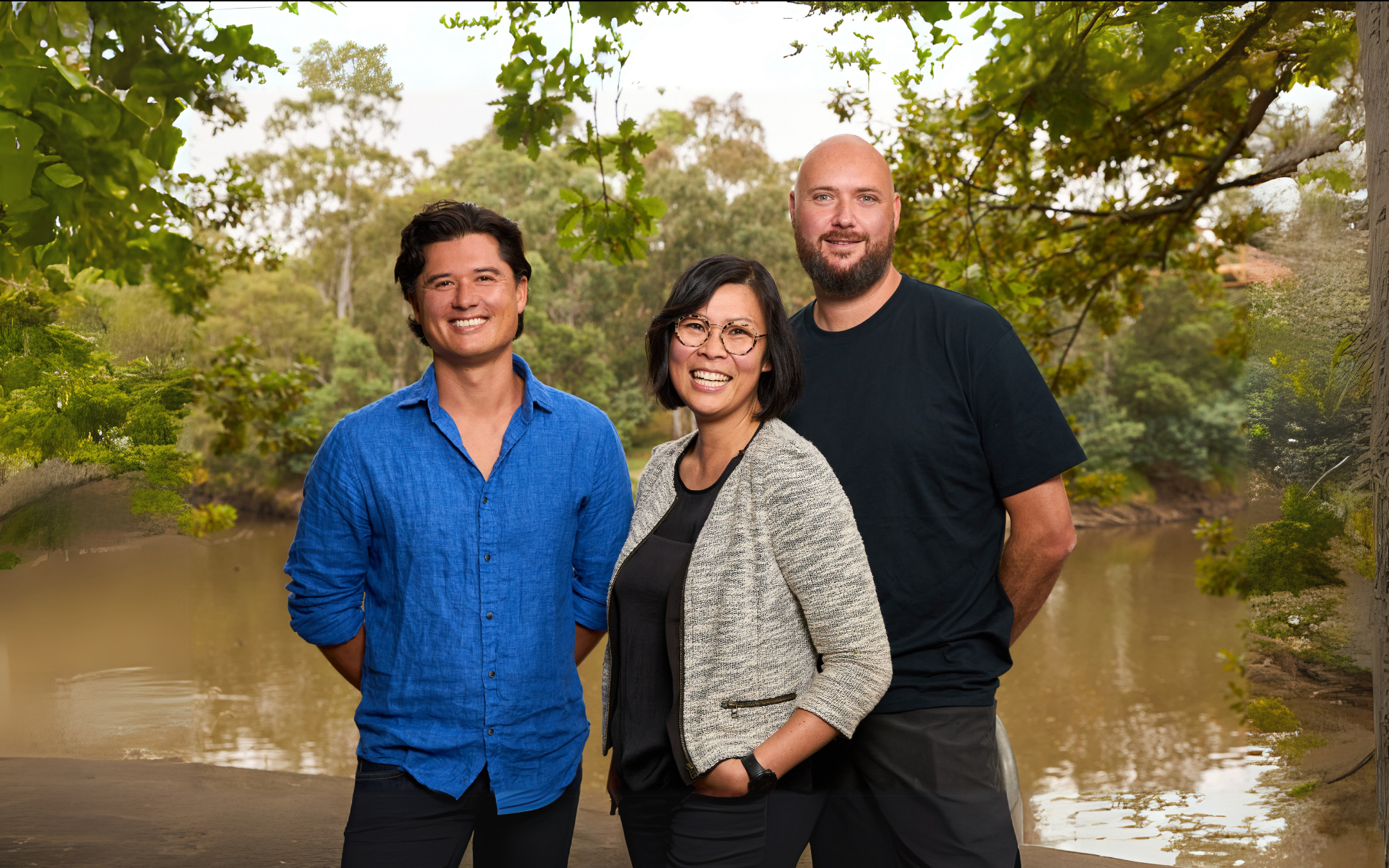This is the first interview in Giant Leap's Femtech Series, featuring leading founders, investors and thought leaders in the femtech space - stay tuned for more to come!
Kristy Chong is the founder of Modibodi, the well-known leak-proof apparel brand that provides a sustainable and more comfortable alternative to disposable hygiene. Kristy’s vision with Modibodi was for all people to have higher expectations of the emotional and ethical comfort they get from clothing, forgo disposables, and feel empowered to live more comfortably in themselves, without limitations.
After 10 years at the helm of Modibodi as CEO, Kristy sold Modibodi to global health company Essity in 2022, and was awarded an Order of Australia Medal in 2023 for her contribution to business and for championing women’s health. Kristy now dedicates her time to her 4 kids, investing in and advising female owned, social impact led businesses, and through philanthropy within the areas of sustainability and gender equity.
Having weathered the storm as a solo founder and having built her solution into an internationally-recognised brand, we couldn’t think of a better person to ask for their advice on how to navigate creating an entirely new product category, educating the market, and scaling up towards a successful exit.
Modibodi’s success has fundamentally changed people’s habits, turning sustainable, leak-proof underwear from niche to mainstream. A lot of impact startups are trying to do just that – how did you know that your idea was worth pursuing?
In the early days, my focus was squarely on the huge problem that Modibodi solves, and on developing a great product to solve it. Heavy periods and light incontinence are problems faced by many people, and ones I had experienced in my own life after pregnancy. I was desperate to find a sustainable solution, and when I couldn’t find any out there, I had to create it myself. I honestly wasn’t thinking about building Modibodi into a large business at the start.
After several years of research and product development, my focus shifted to testing the market. It was only after another two years of this that I brought on other team members and external funding. By that stage, I then knew I had achieved decent product market fit and that people really wanted and needed the product.
Once Modibodi was performing well in the market, we saw all the broader use-cases that consumers were using the products for that we hadn’t thought about at the start. This helped us expand our product range, for example by introducing products for men – but at the beginning, the only things on my mind were the problem and my idea for a solution.
Changing consumer habits involves a lot of education, and particularly so when you’re dealing with topics that are still seen as sensitive or taboo (even when they shouldn’t be). What advice would you give to founders faced with educating the market?
Educating the market takes a lot of marketing dollars! That’s honestly the advice I’d give.
For every dollar I spent on customer acquisition, I spent $2 on growing the market. Eventually you cap out, so you have to work on increasing the overall market size again – that’s where it becomes tricky once competitors start to crowd in.
On the education piece, was it harder to educate customers or investors? Did you use different approaches to bring both groups on board?
It was much easier to educate customers! There was a vast range of product use cases and content that resonated with different customer audiences, and it was just a matter of working each of those out and actively pursuing it. I’m also naturally more of a brand person and preferred connecting with customers than pitching to investors.
I went through the SBE Accelerator program in the earlier days of the business and found that VCs weren’t interested in talking to me – both because I was running a D2C, product-based business, and because they couldn’t understand the feminine hygiene space. So many investors just couldn’t see the market opportunity or consumer need. So, I skipped VC funding and went straight to private equity. That said, a little bit of angel investment at the start really helped to get the business to cash flow positivity.
I think the VC ecosystem still struggles a lot on the investor education front. Many women-led businesses are product-based, and this presents a real barrier when there’s the prevailing expectation that you need to have revenue-based traction in order to be investible. Most women can’t afford the risk of bootstrapping and not working for a few years in order to get an idea off the ground and build a physical product – this is limiting innovation and disadvantaging people who have great business ideas.
At what point did you know that your idea was capable of scaling into something huge? When did it start to feel like you had enough traction that this was no longer a wild idea and had become something mainstream?
I really felt this change between 2018 and 2019 after taking on private equity capital, which enabled Modibodi to expand internationally. That’s when it started to feel like I was really on to something. I would go out and people would tell me they knew about the brand. Even now, it’s a great feeling when people are familiar with the product.
After our home market of Australia, we expanded to the UK. This was a more like minded market and bigger on sustainability, as well as being on the doorstep to Germany and France, who are leading in sustainability policies.
The first $1m of revenue is always the hardest, and it gets easier from there.
As an early mover in the space, how did (or didn’t) your strategy change when competitors started to come into the period and leak-proof underwear space?
As the first mover in the Australian market, it was always hard when competitors launched. Our first real competitor was an Australian brand that launched in 2018 – there was an American company before that too, but we succeeded in pushing them out of the market. The competitive landscape influenced my strategy to expand to the UK, rather than the US.
With the Australian competitor, I immediately went out and bought the product, and thought it was much poorer quality than what we were offering and assumed we’d win on that front alone. However, I underestimated the fact that it was a lot cheaper and that consumers would therefore still buy it. They also copied our branding, so we had to pivot and start to push more of our sustainability credentials. Building a solid brand became even more important once the market became competitive.
Bonds then also came into the period underwear space, and this was also tough – but the silver lining was that having a large incumbent move in really helped to grow the category overall. At the end of the day, our product worked better, and our genuine commitment to sustainability pushed our brand to the front.
All of that said, we see our real key competitor as traditional, non-sustainable disposable hygiene products.
Luck and timing can play crucial roles in the success of a startup. Can you share any instances where serendipity or being in the right place at the right time played a significant role in Modibodi's journey?
We were lucky for a number of reasons, particularly with timing.
There were three key tailwinds that accelerated our trajectory. First, our launch in 2013 coincided perfectly with the mainstreaming of e-commerce – being able to ride that wave made our growth journey a lot cheaper than it would have been a few years earlier.
Second, the fourth wave of feminism, the strength of the #MeToo movement, and women demanding a voice aligned perfectly with our mission and allowed us to talk about historically ‘taboo’ subjects like periods and menstrual care in a more casual, conversational way. We saw women really get behind the product and that was wonderful for us.
Third, when the COVID-19 pandemic hit in 2020, it also bolstered the sustainability movement, with people caring more about their own health and that of the planet. These changes in consumer sentiment aligned with our core philosophy and mission and supported our continued growth.
Modibodi saw a successful exit with its acquisition by Swedish company, Essity. Many startup founders aspire to build companies that eventually exit successfully. Did Modibodi have a predefined exit strategy, or did the opportunity present itself organically?
I didn’t have an exit strategy in the early days by any means. When I started Modibodi, I was 100% focused on the problem and the solution – the exit process came about later on and was entirely organic.
From my experience of building the business over the years, doing the SBE Accelerator and taking on an advisory board, I decided that the angel investment and private equity route was the right path for Modibodi. Once you go down the private equity route, you then need to exit. I felt that the brand needed to sit under a company like Essity for it to really achieve global reach and therefore create maximum impact.
Following the acquisition by Essity, Modibodi has successfully grown into the European market. Essity also acquired another of our key competitors, a Canadian brand that was the largest in the world – so that brand is operating in the US and Canadian markets, and Modibodi will grow everywhere else. It will be interesting to see what Essity does in Asia in the future.
When people talk about Modibodi’s journey now, all they see is the success – but as with any startup, I’m sure the start of the road was anything but easy. What’s one piece of advice you wish you could go back and tell yourself on Day 1?
I would tell myself that it’s going to be really tough and because of that, you can’t afford to sweat the small stuff. I say that because, in the early days, I really sweated a lot of the small stuff! The big problems are the important ones to tackle.
If you take a solution-minded approach to your business throughout the journey, you will get through it. If you let the small stuff get under your skin, it won’t be sustainable from a personal and mental health perspective.
—
Kristy Chong OAM has won numerous awards including the 2018 NSW Business Woman of the Year Award and 2021 Veuve Cliquot Bold Woman award. Modibodi also won the People's Choice Award and Medium Business Awards at the 2019 National Telstra Business Awards, and was recognised by the Museum of Applied Arts and Sciences and acquired in its permanent collection as an Australian Innovation.
If you are a woman founder with an impact-led business who is looking for advice and investment or a charity who is looking for advice and financial support in the spaces of sustainability or gender equity, feel free to reach out to Kristy on LinkedIn.




%20-%20Edited.jpg)



